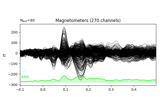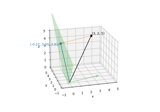mne.compute_proj_epochs¶
- mne.compute_proj_epochs(epochs, n_grad=2, n_mag=2, n_eeg=2, n_jobs=1, desc_prefix=None, meg='separate', verbose=None)[source]¶
Compute SSP (signal-space projection) vectors on epoched data.
This function aims to find those SSP vectors that will project out the
nmost prominent signals from the data for each specified sensor type. Consequently, if the provided input data contains high levels of noise, the produced SSP vectors can then be used to eliminate that noise from the data.- Parameters
- epochsinstance of
Epochs The epochs containing the artifact.
- n_grad
int Number of vectors for gradiometers.
- n_mag
int Number of vectors for magnetometers.
- n_eeg
int Number of vectors for EEG channels.
- n_jobs
int The number of jobs to run in parallel (default 1). Requires the joblib package. Number of jobs to use to compute covariance.
- desc_prefix
str|None The description prefix to use. If None, one will be created based on the event_id, tmin, and tmax.
- meg
str Can be ‘separate’ (default) or ‘combined’ to compute projectors for magnetometers and gradiometers separately or jointly. If ‘combined’,
n_mag == n_gradis required and the number of projectors computed for MEG will ben_mag.New in version 0.18.
- verbosebool,
str,int, orNone If not None, override default verbose level (see
mne.verbose()and Logging documentation for more). If used, it should be passed as a keyword-argument only.
- epochsinstance of
- Returns
- projs:
list List of projection vectors.
- projs:
See also

